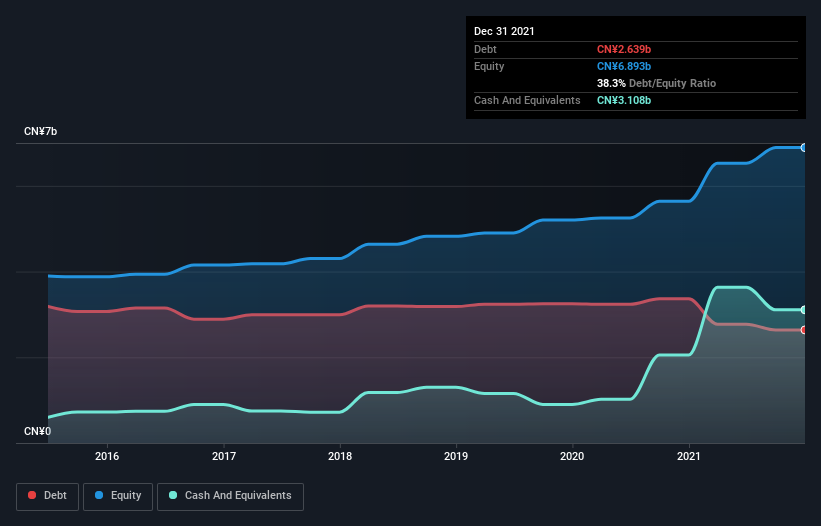- Hong Kong
- /
- Metals and Mining
- /
- SEHK:826
Tiangong International (HKG:826) Has A Pretty Healthy Balance Sheet
The external fund manager backed by Berkshire Hathaway's Charlie Munger, Li Lu, makes no bones about it when he says 'The biggest investment risk is not the volatility of prices, but whether you will suffer a permanent loss of capital.' When we think about how risky a company is, we always like to look at its use of debt, since debt overload can lead to ruin. We can see that Tiangong International Company Limited (HKG:826) does use debt in its business. But the real question is whether this debt is making the company risky.
When Is Debt A Problem?
Debt is a tool to help businesses grow, but if a business is incapable of paying off its lenders, then it exists at their mercy. If things get really bad, the lenders can take control of the business. While that is not too common, we often do see indebted companies permanently diluting shareholders because lenders force them to raise capital at a distressed price. Of course, the upside of debt is that it often represents cheap capital, especially when it replaces dilution in a company with the ability to reinvest at high rates of return. When we think about a company's use of debt, we first look at cash and debt together.
Check out our latest analysis for Tiangong International
How Much Debt Does Tiangong International Carry?
You can click the graphic below for the historical numbers, but it shows that Tiangong International had CN¥2.64b of debt in December 2021, down from CN¥3.37b, one year before. But it also has CN¥3.11b in cash to offset that, meaning it has CN¥469.2m net cash.

A Look At Tiangong International's Liabilities
The latest balance sheet data shows that Tiangong International had liabilities of CN¥4.48b due within a year, and liabilities of CN¥1.19b falling due after that. Offsetting these obligations, it had cash of CN¥3.11b as well as receivables valued at CN¥2.13b due within 12 months. So its liabilities outweigh the sum of its cash and (near-term) receivables by CN¥432.8m.
Given Tiangong International has a market capitalization of CN¥7.12b, it's hard to believe these liabilities pose much threat. However, we do think it is worth keeping an eye on its balance sheet strength, as it may change over time. While it does have liabilities worth noting, Tiangong International also has more cash than debt, so we're pretty confident it can manage its debt safely.
One way Tiangong International could vanquish its debt would be if it stops borrowing more but continues to grow EBIT at around 17%, as it did over the last year. When analysing debt levels, the balance sheet is the obvious place to start. But ultimately the future profitability of the business will decide if Tiangong International can strengthen its balance sheet over time. So if you're focused on the future you can check out this free report showing analyst profit forecasts.
Finally, a company can only pay off debt with cold hard cash, not accounting profits. While Tiangong International has net cash on its balance sheet, it's still worth taking a look at its ability to convert earnings before interest and tax (EBIT) to free cash flow, to help us understand how quickly it is building (or eroding) that cash balance. Looking at the most recent three years, Tiangong International recorded free cash flow of 33% of its EBIT, which is weaker than we'd expect. That weak cash conversion makes it more difficult to handle indebtedness.
Summing up
While it is always sensible to look at a company's total liabilities, it is very reassuring that Tiangong International has CN¥469.2m in net cash. And it impressed us with its EBIT growth of 17% over the last year. So we are not troubled with Tiangong International's debt use. There's no doubt that we learn most about debt from the balance sheet. However, not all investment risk resides within the balance sheet - far from it. For example - Tiangong International has 2 warning signs we think you should be aware of.
When all is said and done, sometimes its easier to focus on companies that don't even need debt. Readers can access a list of growth stocks with zero net debt 100% free, right now.
Valuation is complex, but we're here to simplify it.
Discover if Tiangong International might be undervalued or overvalued with our detailed analysis, featuring fair value estimates, potential risks, dividends, insider trades, and its financial condition.
Access Free AnalysisHave feedback on this article? Concerned about the content? Get in touch with us directly. Alternatively, email editorial-team (at) simplywallst.com.
This article by Simply Wall St is general in nature. We provide commentary based on historical data and analyst forecasts only using an unbiased methodology and our articles are not intended to be financial advice. It does not constitute a recommendation to buy or sell any stock, and does not take account of your objectives, or your financial situation. We aim to bring you long-term focused analysis driven by fundamental data. Note that our analysis may not factor in the latest price-sensitive company announcements or qualitative material. Simply Wall St has no position in any stocks mentioned.
About SEHK:826
Tiangong International
Manufactures and sells alloy steel, cutting tools, titanium alloys, and related products.
Reasonable growth potential with adequate balance sheet.
Market Insights
Community Narratives



